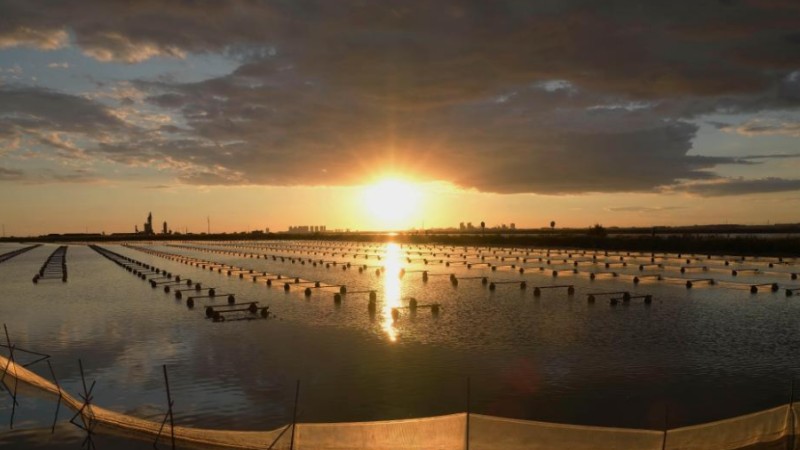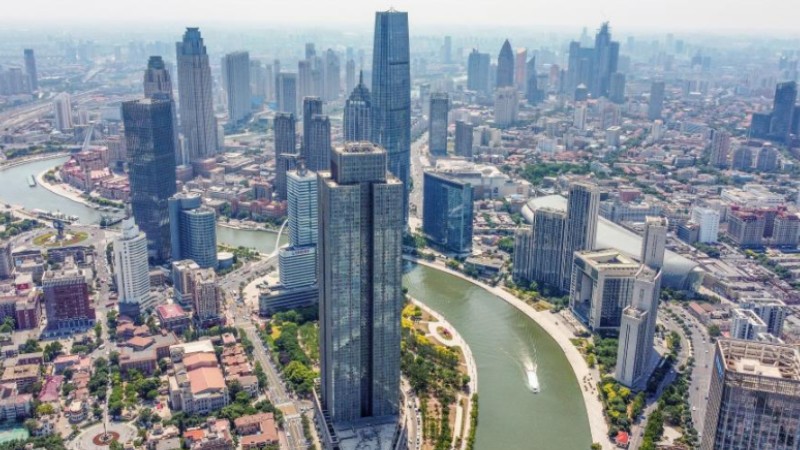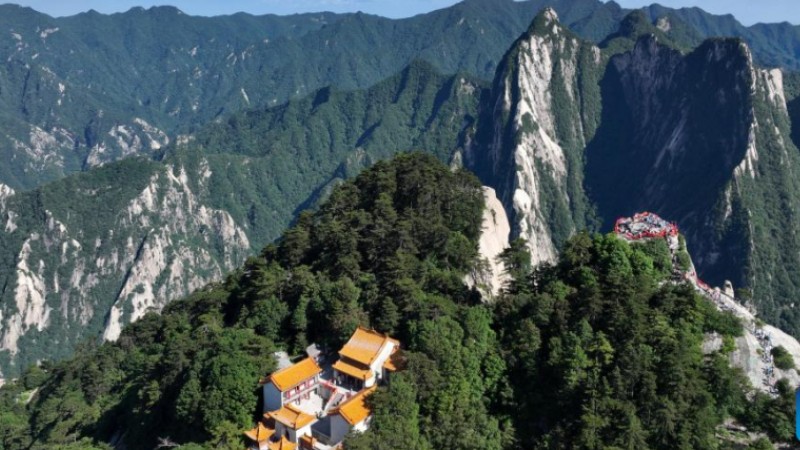China's diplomacy to further consolidate and expand 'circle of friends' in summer, with Xi meeting visiting leaders from New Zealand, Barbados, Mongolia, Vietnam
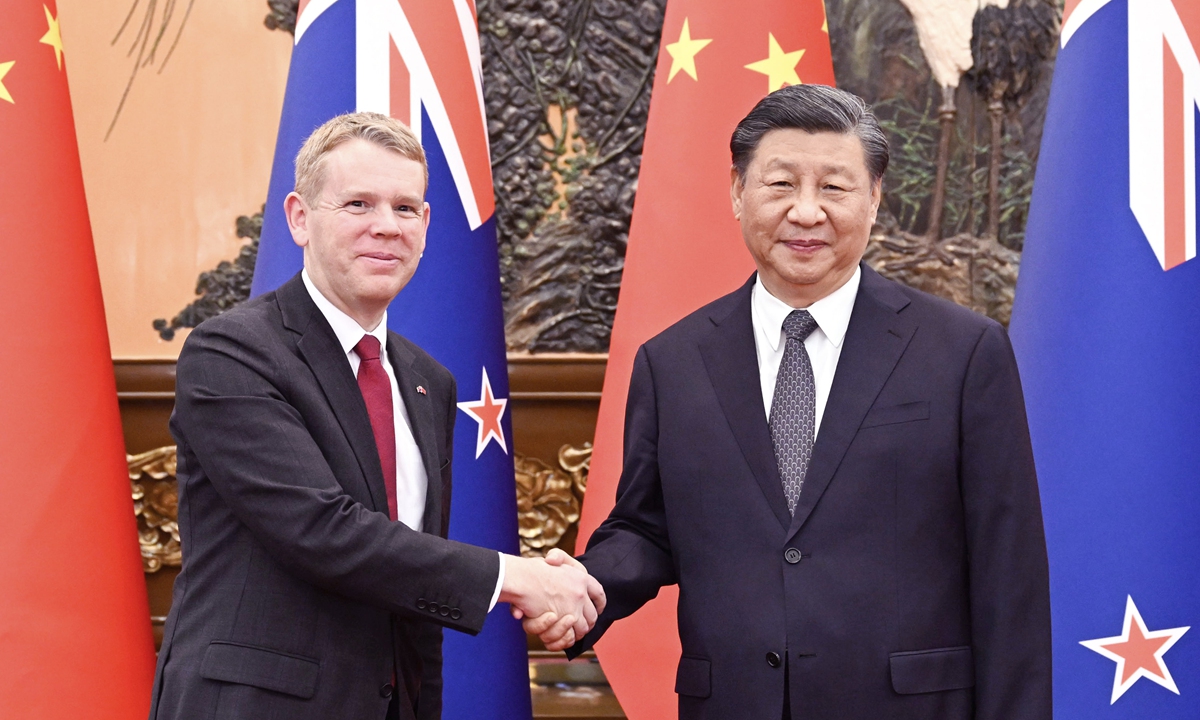
Chinese President Xi Jinping (right) meets with visiting Prime Minister of New Zealand Chris Hipkins in Beijing on June 27, 2023. Photo: Xinhua
After realizing significant diplomatic goals like helping the reconciliation between Saudi Arabia and Iran in March, Chinese diplomacy is continually pushing for more achievements in summer with Chinese President Xi Jinping busily meeting with visiting Prime Minister of New Zealand Chris Hipkins, Prime Minister of Barbados Mia Amor Mottley, Prime Minister of Vietnam Pham Minh Chinh as well as Prime Minister of Mongolia Luvsannamsrai Oyun-Erdene in Beijing on Tuesday.
China and New Zealand agreed to keep expanding cooperation in economy and trade, education, technology, tourism as well as people-to-people and cultural exchanges, according to a release of the meeting between Xi and Hipkins.
Xi said he has always attached great importance to the relationship between China and New Zealand. The relationship between China and New Zealand has always led China's relationship with developed countries. The two sides should continue to carry forward the spirit of striving to be the best, and constantly consolidate and deepen the China-New Zealand comprehensive strategic partnership, Xi noted.
Last year marked the 50th anniversary of the establishment of diplomatic relations between China and New Zealand.
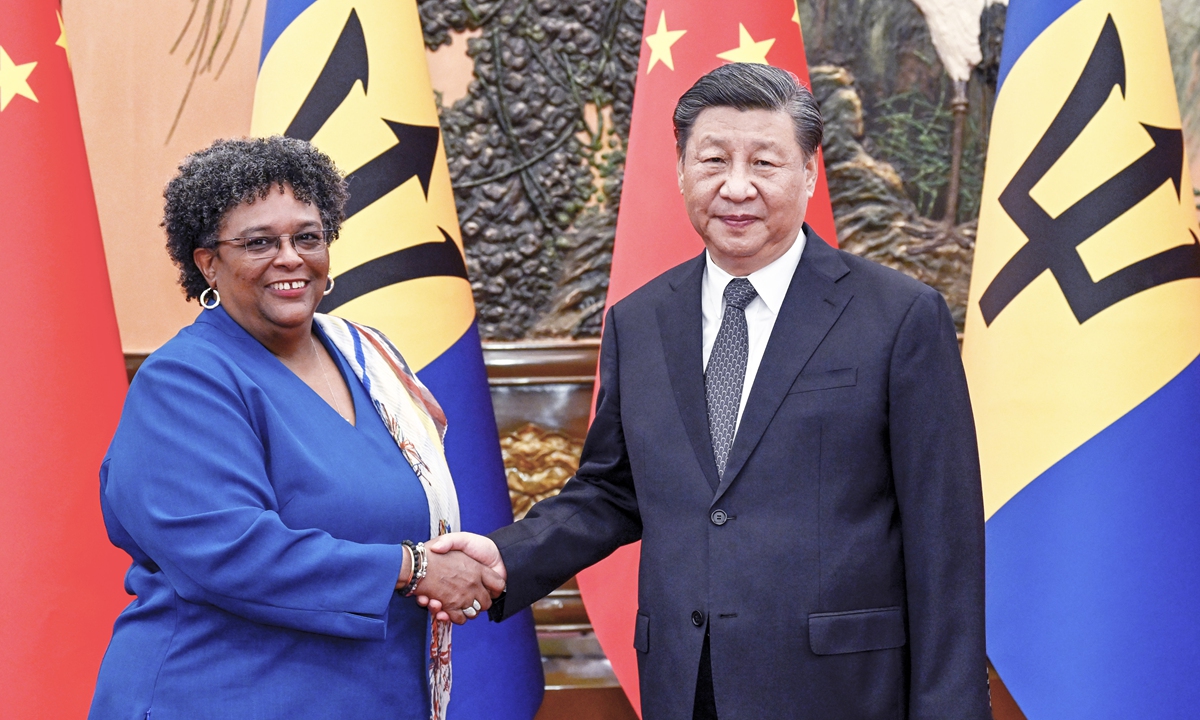
Chinese President Xi Jinping (right) meets with visiting Prime Minister of Barbados Mia Amor Mottley in Beijing on June 27, 2023. Photo: Xinhua
During the meeting with Mottley, Xi noted that Barbados is the first country in the Eastern Caribbean to establish diplomatic relations with China, and is also a good friend and partner of China in this region. He called on the two countries to deepen political mutual trust and continue to understand and support each other on issues concerning each other's core interests and major concerns. China, as always, supports Barbados in safeguarding national sovereignty and independence, and independently choosing a development path, Xi noted.
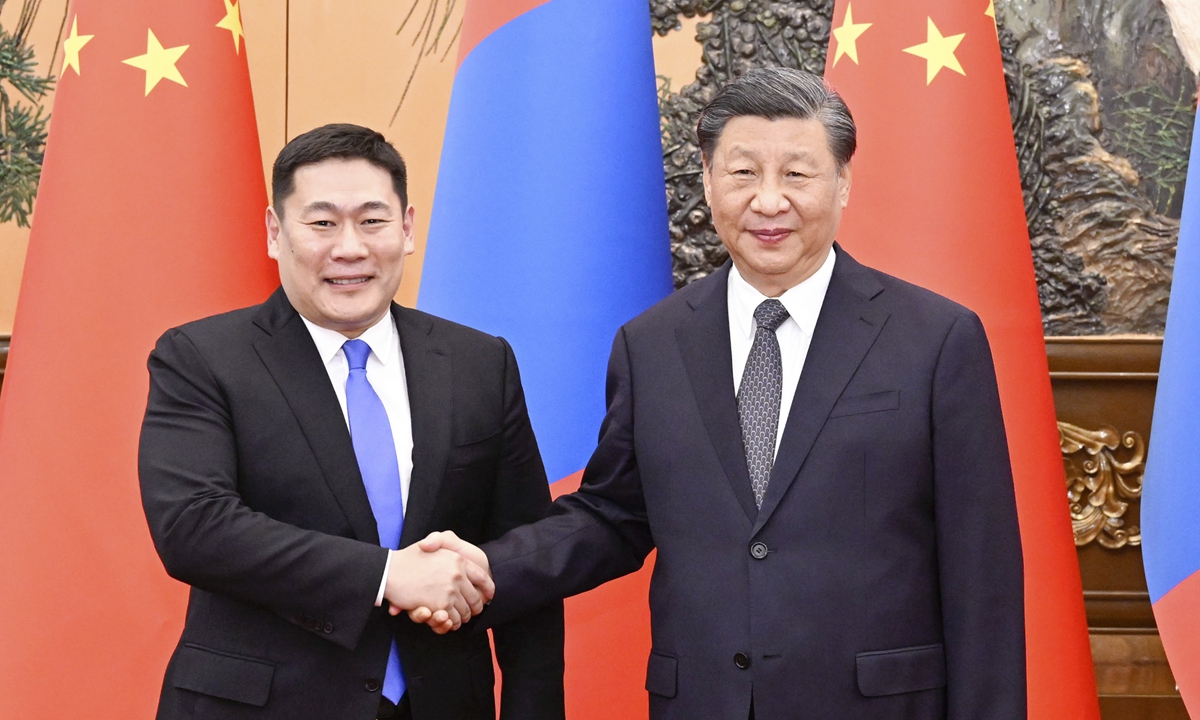
Chinese President Xi Jinping (right) meets with visiting Prime Minister of Mongolia Luvsannamsrai Oyun-Erdene in Beijing on June 27, 2023. Photo: Xinhua
China and Mongolia vowed to enhance cooperation in various fields, including combating desertification, building the China-Mongolia-Russia Economic Corridor and the construction of the Belt and Road Initiative. China and Mongolia are both developing countries and share extensive common interests and similar positions in international and regional affairs. China supports Mongolia in playing an active role in regional and international affairs, Xi noted.
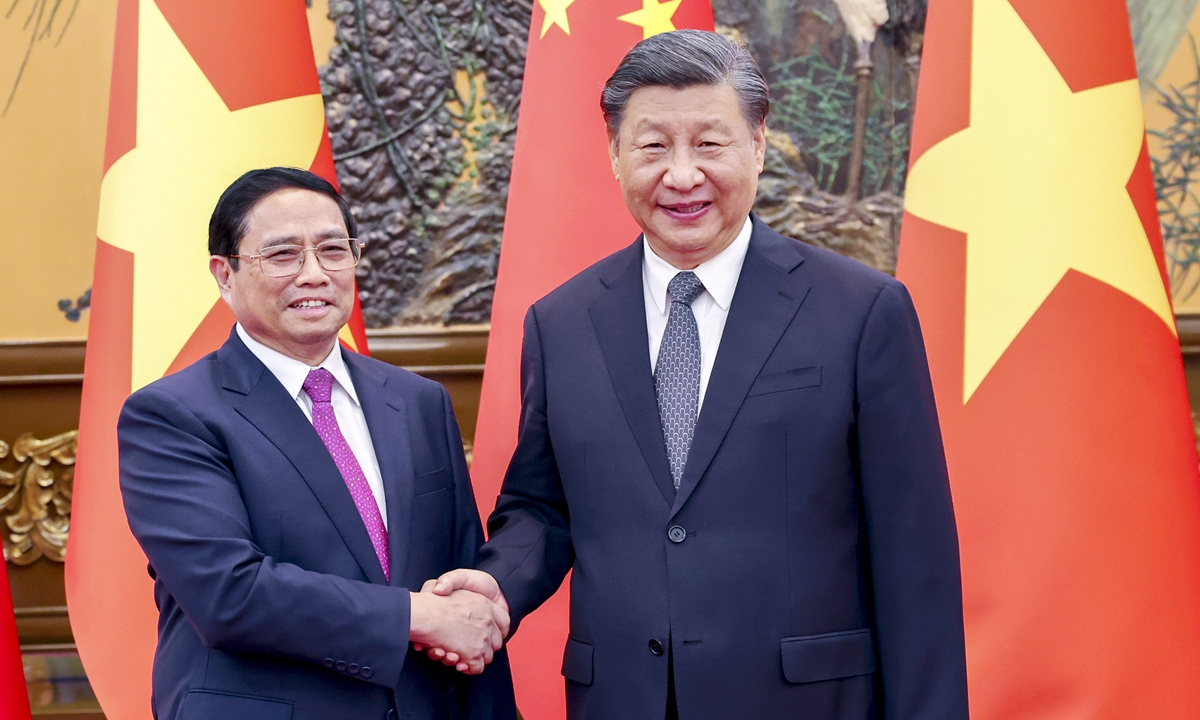
Chinese President Xi Jinping (right) meets with visiting Prime Minister of Vietnam Pham Minh Chinh in Beijing on June 27, 2023. Photo: Xinhua
This year marks the 15th anniversary of the establishment of the China-Vietnam comprehensive strategic cooperative partnership. Xi said that, facing the increasingly severe and complex international situation, China and Vietnam should uphold the spirit of equality, mutual benefit, solidarity and mutual trust, win-win cooperation, and should work together to seek common development, better benefit the two countries, and inject more stability into the turbulent world.
Pham Minh Chinh said that Vietnam opposes the politicization of economic issues, and is willing to work closely with China to prevent and deal with risks and challenges, prevent any force from alienating Vietnam-China relations and build a Vietnam-China comprehensive strategic cooperative partnership with a shared destiny.
Barbados, Mongolia, New Zealand and Vietnam are located on different continents, and have different political systems, histories, cultures, stages of development and economic sizes. China's efforts to improve ties with these countries show that the world will be further connected with each other. Members of the international community want to seek certainties and possibilities from China, and they will not follow moves to "decouple" or provoke "confrontation" launched by the US against China, experts noted.
New Zealand - a member of the US-led Five Eyes Alliance and an Anglo-Saxon nation - attaches great importance to developing relations with China. This time, as Hipkins is accompanied by a large economic and trade delegation, the trip aims to explore more cooperation opportunities and promote New Zealand-China relations to a new level, the New Zealand Prime Minister said during the meeting with Xi.
Chinese experts praised the independent policymaking of New Zealand which shows the consensus shared by different political parties within the country on how to get along with China. It presents an example of how Western countries can withstand the pressures of unilateralism, Cold War mentality and hegemony, as well as preserve their strategic autonomy to develop ties with China and benefit their people.
Compared with other members of the Five Eyes Alliance - the US, the UK, Australia and Canada, New Zealand is a country that is able to maintain equal and pragmatic relations and mutual respect with China, and bilateral ties have not been impacted by the China-US tension for a very long time.
In April 2022, during the term of Hipkins' predecessor Jacinda Ardern and a difficult for the world due to the COVID-19 pandemic, the two countries upgraded the protocol of the China-New Zealand Free Trade Agreement.
After Ardern resigned in January, Hipkins, also from the Labor Party of New Zealand, assumed office, and Ardern's strategic autonomy and pragmatic policy on China have been maintained and further developed.
According to Reuters, Hipkins, ahead of his trip to China, said on Thursday that he did not agree with US President Joe Biden's absurd and provocative remarks on the Chinese national leader and political system. "The form of government that China has is a matter for the Chinese people," Hipkins told reporters.
This shows that the government of New Zealand and the policymakers of the country have held a principle of non-interference when dealing with China, and refused to follow the arrogant and offensive attitude of Washington, while Wellington is able to develop ties with China based on the interests of New Zealand's people, analysts said.
Chen Hong, director of the New Zealand Studies Center at East China Normal University, told the Global Times on Tuesday that "Hipkins' visit shows the resilience of China-New Zealand ties. New Zealand is a small country, but it didn't choose to abandon its autonomy to blindly and unconditionally follow the instructions of a superpower, but has preserved its pragmatic policymaking." This is why the country can continue to benefit from its ties with China and avoid the damage caused by the US-led confrontation with China.
If other countries around the globe, especially Western ones, can learn some wisdom and experience from New Zealand's policy on China, the global recovery will be greatly optimized, the world order will be a lot more stable and the danger of bloc confrontation and the risks of more geopolitical crises will significantly reduce, said Li Haidong, a professor at the China Foreign Affairs University.
Photos
Related Stories
- Xi: Nations welcome to share opportunities
- China's self-reliance is not a closed-door policy, Xi says
- Xi lauds youths as hope of nation, CPC
- Xi calls on Communist Youth League to shoulder missions
- Quotes from Xi: Holding rice bowls firmly in our own hands
- Xiplomacy: Chinese president corresponds with Belgian zookeeper over pandas, friendship
- Xi Story: Spirit of ancient poet resonates in modern China
- China, U.S. should work together in same direction to stabilize, improve bilateral relations
- Xi orders all-out rescue and safety overhaul after deadly barbecue restaurant explosion
- Key messages from Xi's meeting with Blinken
Copyright © 2023 People's Daily Online. All Rights Reserved.







